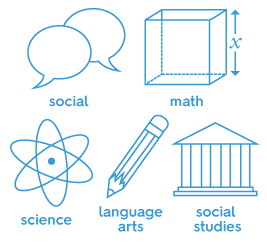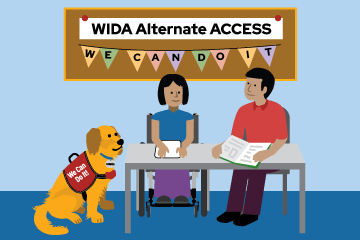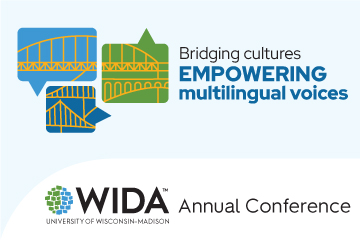Resources/Recursos
Featured Resources



All resources/Todos los recursos
Language-Focused Family Engagement
This WIDA Focus Bulletin introduces readers to the four pillars of Language-Focused Family Engagement and provides tools to help educators examine their local family engagement practices.
Published September 2018
Author: Delis Cuéllar, Alissa Blair, Lorena Mancilla
Less Than Four Domains: Creating an Overall Composite Score as an Indicator of English Language Proficiency for English Learners with 504 or Individualized Education Plans
The illustrated models and procedures can be applied to calculate overall composite scores to identify an indicator of English language proficiency, based on composite scores for English learners with 504 or individualized education plans who are missing one or more domain scores on the Assessing Comprehension and Communication in English State-to-State for English Language Learners assessment for state monitoring, achievement and accountability determinations.
Resource DetailsLinking Scores from WIDA MODEL Online to the Common European Framework of Reference (CEFR)
This report describes a research study conducted by WIDA to link scores on the WIDA MODEL Online tests of Listening, Reading, Speaking, and Writing to the Common European Framework of Reference (CEFR). The results of the study are cut scores for each of the four language domain tests that are recommended for classifying test takers according to the levels of the CEFR.
Resource Details View Download NowLong-term English Learners across 15 WIDA States
This research brief presents findings and policy implications from a recent research study exploring the so-called long-term English learner (LTEL) population across WIDA states. The findings highlight a continuing need for research that rejects an overly simplistic understanding of the LTEL designation. The next phase of this research will use student- and school-level data from three states to examine how individual and school factors can affect the diverse trajectories of ELs’ language development over time.
Published January 2019
Resource Details View Download NowMaking Science Multilingual: An Interdisciplinary Program and its Evolution
This report discusses an interdisciplinary and interorganizational endeavor to support the science education of multilingual youth: the Making Science Multilingual program. More specifically, the report addresses the rationale for the program, milestones it accomplished, resources it required, and challenges it faced.
Published November 2020
Authors: Daniella Molle, Weiqiong Scarlett Huang
Resource Details View Download Now
Making Science Multilingual: Supporting Equity Through Design Principles
This Focus Bulletin emphasizes how multilingual learners' everyday language can be an asset to science teachers in their efforts to promote classroom engagement. It provides educators with real-world examples and guiding questions to help create learning spaces where sensemaking, co-construction, language development and equity can flourish simultaneously.
Published June 2022
Authors: Rita MacDonald, David Crowther, Jennifer Wilfrid
Multiliteracies: A Glimpse into Language Arts Bilingual Classrooms
This Focus Bulletin investigates how educators of bi/multilingual learners can leverage multiliteracies for instruction. Drawing from a fictional scenario in a language arts classroom, this bulletin shows how multiliteracies can be leveraged throughout the teaching and learning cycle. The Focus Bulletin includes various perspectives from experts in the field to illustrate the role of multiliteracies, as well as tools for reflection and implementation in the bilingual classroom.
Resource Details View Download NowOral Language in the Classroom
This Focus Bulletin explores the kind of spoken English language that multilingual learners benefit from developing, showing how that oral language is described in WIDA standards resources and assessed on the ACCESS for ELLs Speaking test.
Published October 2019
Authors: Mark Chapman, Dale Erlandson
Performance of Technology-Enhanced Items in Grades 1–12 English Language Proficiency Assessments
Technology-enhanced items (TEIs) are innovative, computer-delivered test items that are more authentic and interactive than traditional multiple-choice items (MCIs). This study examines the performance of grades 1–12 English learners on TEIs compared to MCIs on the reading domain of ACCESS for ELLs Online.
Published December 2020
Authors: Ahyoung Alicia Kim, Rurik L. Tywoniw, Mark Chapman
Promoting Equity for Young Multilingual Children and Their Families
This Focus Bulletin invites early care and education (ECE) educators to promote equity for young multilingual children and their families. In the bulletin, we offer ideas for taking a language-focused approach to equitable caregiving and instructional practice in ECE settings. Also, we highlight voices from the field, and offer reflection questions to help you consider what it means to promote equity for multilingual children and their families.
Published February 2021
Authors: Amanda Spalter, Lorena Mancilla
Providing ELLs with Disabilities Access to Complex Language
This WIDA Focus Bulletin outlines ways in which educators can provide English Language Learners with disabilities access to complex language via classroom activities and engagement opportunities.
Published March 2017
Authors: Lynn Shafer Willner, Cynthia Lundgren, Mira Monroe, Julia Cortada
Scaffolding Learning for Multilingual Students in Math
This WIDA Focus Bulletin provides examples of specific macro-scaffolding and micro-scaffolding practices in action in a math classroom and includes guidance for developing these scaffolding practices over time.
Published June 2018
Authors: Jen Daniels, Ruslana Westerlund
STEM Discourse
This WIDA Focus Bulletin explores ways to strengthen reasoning and language in Science, Technology, Engineering, and Mathematics (STEM) education.
Published January 2017
Author: Rita MacDonald
Students with Limited or Interrupted Formal Education (SLIFE)
This WIDA Focus Bulletin focuses on the needs of students who have limited or interrupted formal education. Because the vast majority of students in this group are enrolled in grades 6 through 12, we will focus on those grade levels. However, many of the tips and suggestions can be applied in lower grade levels as well. Throughout the bulletin we will explore academic and social-emotional factors that may affect this group of students, examine the benefits of building community partnerships, address how to assess student readiness levels, and offer a checklist of considerations for instructional planning.
Published May 2015
Authors: Lauren Keppler, Lucia Morales, Julia Cortada, Maria Austin
Supporting Multilingual Learners Language Growth Through Language Development Portfolios
This Focus Bulletin illustrates how teachers and students can use language development portfolios to interpret and document language growth. The bulletin follows the story of how a grade-level team introduced portfolios to their practice, posing several questions the team asked as they refined their usage. It closes by offering two sample tools that teachers can use and adapt to capture multilingual learners’ language growth using modified Proficiency Level Descriptors (PLDs) from the WIDA English Language Development Framework, 2020 Edition.
Published: December 2022
Authors: Fernanda Marinho Kray, Margo Gottlieb, Lynn Shafer Willner
Supporting Multilingual Students with WIDA and International Baccalaureate Resources
This Focus Bulletin illustrates how educators in featured International Baccalaureate schools are integrating WIDA resources as they design lessons for multilingual learners.
Published June 2019
Authors: Jon Nordmeyer, Ruslana Westerlund, Elizabeth Cranley, Anne Katz
Teaching for Equity: The CLEAR Paradigm
This working paper provides insights into how all teachers can provide linguistically and culturally responsive and equitable education for all students by orchestrating instruction to meet their varying socioemotional, cultural, linguistic and academic needs. Grounded in social justice, the Cultural, Linguistic, Equity, and Responsiveness (CLEAR) paradigm presented in this paper describes a guiding framework for educators who wish to integrate sociocultural and sociolinguistic responsiveness and critical pedagogical practices to achieve quality, equitable education for their students.
Resource DetailsTechnology in the Classroom
This WIDA Focus Bulletin addresses how English Language Learners engage with technology within the classroom.
Published October 2014
Authors: Meagan Rothschild, Julia Cortada
The WIDA Framework for Equitable Instruction of Multilingual Children and Youth in Content-Area Classrooms
The Framework for Equitable Instruction (FEI) is an instruction-focused resource designed to promote the equitable engagement in disciplinary learning and language development of multilingual learners. The FEI complements the WIDA ELD Standards Framework, 2020 Edition. This working paper can inform teachers’ practice, support teacher collaboration within and across disciplines, and serve as a foundation for the design of professional learning opportunities and resources.
Resource DetailsTitle III National Evaluation Supplemental Report
This report addresses three primary questions:
1. How do you determine a meaningful English language performance standard?
2. How do you establish a realistic, empirically anchored time frame for attaining a given ELP performance standard?
3. How can states take into account English learners’ English language performance level when setting academic progress and proficiency expectations?
Published May 2013
Resource Details View Download Now



